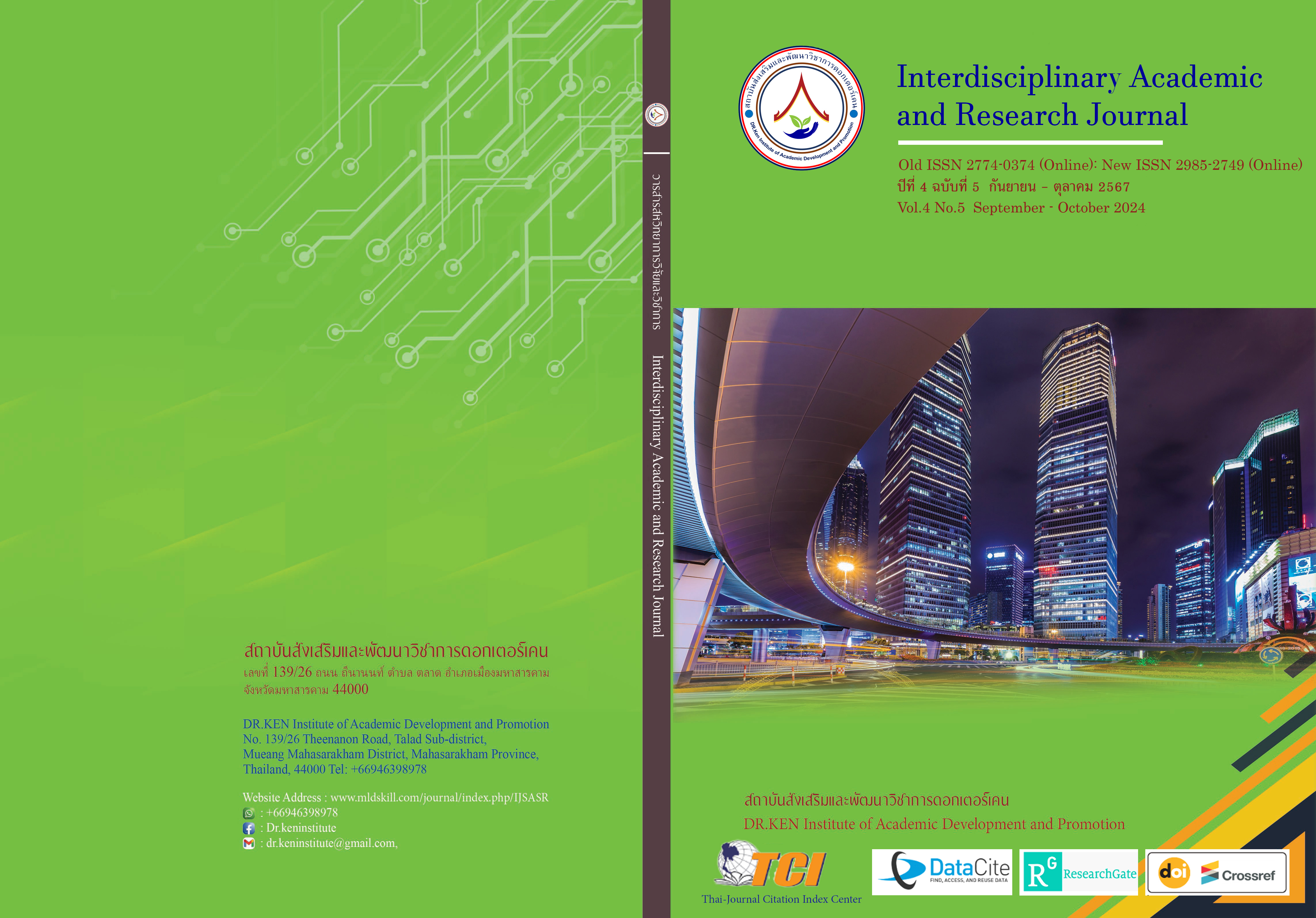Technology Leadership of Educational Institution Administrators under the Lopburi Provincial Learning Promotion Office
DOI:
https://doi.org/10.60027/iarj.2024.276820Keywords:
Leadership; , Technology leader; , Lopburi Provincial Learning Promotion OfficeAbstract
Background and Aims: Nowadays, technology play an important role in the management of educational institutions. Educational institution administrators need to have technological leadership to be able to manage education effectively. Using existing technology in the management process, promoting and supporting personnel under the organization. It will greatly increase the usefulness and efficiency of work in today's era. Therefore, it is necessary to develop, improve and modernize the existing education system. and consistent with technological changes this research has the following objectives: (1) Study the level of technological leadership of educational institution administrators under the Lopburi Provincial Learning Promotion Office. (2) Compare the technological leadership of educational institution administrators under the Lopburi Provincial Learning Promotion Office classified by position education level and work experience. (3) Study guidelines for developing technological leadership of educational institution administrators under the Lopburi Provincial Learning Promotion Office.
Methodology: The sample group used in the research included 127 school administrators and teachers under the Lopburi Provincial Learning Promotion Office. The sample size was determined according to Krejci and Morgan's table. and the sample was selected using stratified random sampling. The research instrument consisted of a questionnaire using a 5-level rating scale with a consistency index between 0.80-1.00 and the reliability of the entire questionnaire was 0.96. In addition, interviews were used as additional tools. In data analysis use a variety of statistics including frequency, percentage, mean, standard deviation, T-test, F-test, and Scheffe's Method analysis.
Results: The results of the research found that: (1) Technology leadership of school administrators under the Lopburi Provincial Learning Promotion Office overall and in each aspect, it is at a "very" level. (2) Technology leadership comparison results of administrators of educational institutions under the Lopburi Provincial Learning Promotion Office classified by position Education level and work experience It was found that overall and, in each aspect, there were no differences. However, when classified according to work experience It was found that overall, there were no differences. But in terms of supporting the use of technology in measurement and evaluation. There is a statistically significant difference at the 0.05 level. (3) Guidelines for developing technology leadership of educational institution administrators under the Lopburi Provincial Learning Promotion Office, it consists of 5 main areas: 1) Having leadership and technology vision, 2) supporting teaching and learning using technology, 3) ethics in using technology, 4) supporting the use of technology in administration, 5) supporting the use of technology in measurement and evaluate.
Conclusion: Technology leadership of educational institution administrators’ emphasis should be placed on appropriate management and application of technology in educational institutions. To achieve maximum efficiency in operations and development of educational quality.
References
กันตชาติ กุดนอก. (2565). ภาวะผู้นำดิจิทัลของผู้บริหารที่ส่งผลต่อประสิทธิผลของโรงเรียน สังกัดสำนักงานเขตพื้นที่การศึกษาประถมศึกษานครพนม เขต 2. วิทยานิพนธ์ปริญญาครุศาสตร มหาบัณฑิต, สาขาวิชาการบริหารการศึกษา, มหาวิทยาลัยราชภัฏสกลนคร. สกลนคร.
ชัยนาม บุญนิตย์. (2563). ภาวะผู้นำทางเทคโนโลยีและนวัตกรรมของผู้บริหารสถานศึกษา สังกัดสำนักงานเขตพื้นที่การศึกษาประถมศึกษาสุโขทัย เขต 2. วิทยานิพนธ์หลักสูตรครุศาสตรมหาบัณฑิต, สถาบันมหาวิทยาลัยราชภัฏอุตรดิตถ์. อุตรดิตถ์.
รุจาภรณ์ ลักษณะดี. (2565). ภาวะผู้นำดิจิทัลของผู้บริหารสถานศึกษาในสหวิทยาเขตบ้านบึง 1 สังกัดสำนักงานเขตพื้นที่การศึกษาประถมศึกษาชลบุรี เขต 1. วิทยานิพนธ์ปริญญาศึกษาศาสตรมหาบัณฑิต, มหาวิทยาลัยเกริก.
วรรณนภา จำเนียรพืช. (2564). ภาวะผู้นำทางเทคโนโลยขีองผู้บริหารสถานศึกษาที่ส่งผลต่อทักษะครูในศตวรรษที่21 ของสถานศึกษา สังกัดสำนักงานเขตพื้นที่การศึกษามัธยมศึกษาเขต 3 จังหวัดพระนครศรีอยุธยา.วิทยานิพนธ์ปริญญาครุศาสตรมหาบัณฑิต, มหาวิทยาลัยราชภัฏพระนครศรีอยุธยา. พระนครศรีอยุธยา.
สำนักงานเลขาธิการสภาการศึกษา. (2560). แผนการศึกษาแห่งชาติ พ.ศ. 2560-2579. พิมพ์ครั้งที่ 1. กรุงเทพฯ: พริกหวานกราฟฟิค.
สุธิกานต์ บริเอก. (2564). ภาวะผู้นำของผู้บริหารสถานศึกษาที่ส่งผลต่อการปฏิบัติงานของครูผู้สอนในโรงเรียน สังกัดสำนักงานเขตพื้นที่การศึกษามัธยมศึกษา เขต 22. ปริญญาครุศาสตรมหาบัณฑิต สาขาวิชาการบริหารการศึกษา, มหาวิทยาลัยราชภัฏสกลนคร. สกลนคร.
อภิญญา พลอาสา. (2566). ภาวะผู้นำของผู้บริหารสถานศึกษาในศตวรรษที่ 21 สังกัดสำนักงานส่งเสริมการศึกษานอกระบบและการศึกษาตามอัธยาศัย จังหวัดอุบลราชธานี. วารสารการบริหารการศึกษา มมร.วิทยาเขตร้อยเอ็ด, 3(1), 36-47.
Krejcie, R. V., & Morgan, D. W. (1970). Determining sample size for research activities. Educational and Psychological Measurement, 30(3), 607–610.
Downloads
Published
How to Cite
Issue
Section
License
Copyright (c) 2024 Interdisciplinary Academic and Research Journal

This work is licensed under a Creative Commons Attribution-NonCommercial-NoDerivatives 4.0 International License.
Copyright on any article in the Interdisciplinary Academic and Research Journal is retained by the author(s) under the under the Creative Commons Attribution-NonCommercial-NoDerivatives 4.0 International License. Permission to use text, content, images, etc. of publication. Any user to read, download, copy, distribute, print, search, or link to the full texts of articles, crawl them for indexing, pass them as data to software, or use them for any other lawful purpose. But do not use it for commercial use or with the intent to benefit any business.
















.png)


